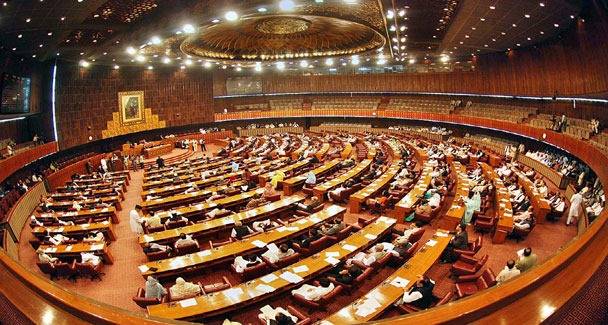Democracy in any country requires a robust parliament. A democratic parliament is representative of the political will and social diversity of the population, and is effective in its legislative and oversight functions, at the national and international level. Very importantly, it should also be transparent, accessible and accountable to the citizens that it represents.
According to a recent report released by the Pakistan Institute of Legislative Development and transparency (PILDAT), the National Assembly, in its second year led by the PML-N, has received an overall score of 48 percent in an evaluation of its performance based on a framework developed by the Inter-Parliamentary Union (IPU). Except for the attendance of the Prime Minister in the National Assembly sittings, 33 during the second year compared to only seven sittings during the first year, the performance of the National Assembly has declined on almost all key indicators of assessment. The National Assembly held 91 sittings in second year as compared to 103 in the first year. And the increase in number of sessions attended by the Prime Minister was the result of pressure generated by sit-ins staged by both the PTI and the PAT.
Of the four provincial assemblies the Khyber-Pakhtunkhwa (K-P) Assembly outperformed any other provincial assembly in the country during parliamentary year 2014-15, scoring 44 per cent for its overall performance on a comparative score card. The provincial assemblies of Sindh and Punjab, who share second spot with a score of 42 percent each, closely followed the KP assembly. Balochistan remained the weakest, as it scored just 39 percent. The Provincial Assembly of the Punjab has once again taken the required initiative of making its member’s attendance available online.
Governance is key to development. Parliaments have an important role to play in delivering governance, which is effective both in terms of reducing poverty, and in terms of building democracy. Functional legislative bodies with requisite capacities are critical to the consolidation of democracy in Pakistan, as these bodies empower ordinary people to participate in the decision-making processes that affect or shape their lives. But the annual findings of the PILDAT regarding performance of assemblies betray a weak role of the parliament.
In terms of enacting laws, debating national issues, checking the activities of the government and in general promoting the welfare of the people, these duties and obligations have never been performed with efficiency and effectiveness by legislative assemblies in Pakistan.
Often, parliamentarians lack the knowledge and skills to do their jobs effectively. And thus parliaments themselves lack the institutional capacity, which they need to discharge their responsibilities. Parliamentary performance is also shaped by the peculiarities of the political system. The nature of political parties in Pakistan does not facilitate strong parliaments. The party leadership in consultation with a close circle of leaders takes major decisions, and the rest of party parliamentarians are merely asked to stamp those decisions without question. The recent revelations by Justice (R) Wajihuddin regarding the decision making process within the PTI are hardly surprising. It was an aberration and a welcome development when the decision of committing armed troops in the Middle Eastern conflict was referred to the parliament, despite pressure from Saudi Arabia.
The wider social and cultural environment of the country, including citizens’ expectations of their representatives, is not helpful in fostering effective parliaments. The social system is still characterized by patrimonialism, a system in which “big men” look after their constituents through providing them with the resources to which their position within the state allows them access. Thus the MPs are more concerned with retaining their seats than with holding the executive to account.
A particularly important element of oversight concerns the budget and checking whether spending decisions are in line with national priorities. The concept of participatory budgeting for increased citizens’ involvement is non-existent in Pakistan. Citizen participation in budget making is critical to address inequalities and enhance the performance of policies and allocations. The participatory budgeting concept works well at the municipal level and in the presence of a well-functioning local government system, a tier that is tragically absent in Pakistan for the last seven years.
Like the participation of citizens, parliamentarian engagement in the budget-making process is also limited in Pakistan where 15 to 20 calendar days are allocated on average for parliamentary debate. In this year, the number of allocated days for budget discussion was reduced to 13 as compared to 17 the last year. Budget sessions are extremely short, leaving insufficient time for substantive discussions. India assigns 75 days for parliamentary discussions and Pakistan should also increase the days allocated for parliamentary debate. Parliamentary performance is also measured by the availability of various means for constituents to have access to their elected representatives. Effective modes of public participation in pre-legislative scrutiny, the right of open consultation for interested parties, public’s right of petition, systematic grievance procedures and the possibility for lobbying, within the limits of agreed legal provisions are essential components of a transparent parliament.
Parliamentary committees are also weak or non-existent. Therefore the ability of the parliament to address issues of major concern to society, to mediate in the times of tension and national vulnerability, to help shape public institutions that cater to the needs of the entire population, remains limited.






